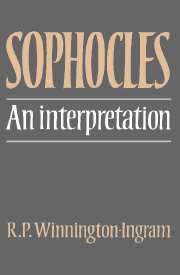Book contents
- Frontmatter
- Contents
- Preface
- Bibliography of short titles
- 1 Introductory
- 2 The mind of Ajax
- 3 The burial of Ajax
- 4 Trachiniae
- 5 Sophocles and the irrational: three odes in Antigone
- 6 Creon and Antigone
- 7 Fate in Sophocles
- 8 The fall of Oedipus
- 9 Furies in Sophocles
- 10 Electra
- 11 Oedipus at Colonus
- 12 Philoctetes
- 13 Heroes and gods
- Appendices
- Select index
9 - Furies in Sophocles
Published online by Cambridge University Press: 07 December 2009
- Frontmatter
- Contents
- Preface
- Bibliography of short titles
- 1 Introductory
- 2 The mind of Ajax
- 3 The burial of Ajax
- 4 Trachiniae
- 5 Sophocles and the irrational: three odes in Antigone
- 6 Creon and Antigone
- 7 Fate in Sophocles
- 8 The fall of Oedipus
- 9 Furies in Sophocles
- 10 Electra
- 11 Oedipus at Colonus
- 12 Philoctetes
- 13 Heroes and gods
- Appendices
- Select index
Summary
There is no mention of an Erinys or Erinyes in Oedipus Tyrannus. Should we find this surprising? True that the curse of Oedipus upon his sons which evoked an Erinys in Septem does not enter, even by hint or inference, into this play. Yet Oedipus was a doomed man under threat in consequence of a breach, if an unwitting breach, of the law governing the relationship between parents and children. He had killed his father; and, apart from matricide, it is hard to imagine an act more likely to evoke an Erinys than parricide. But Apollo is the only specific divine power that seems to be concerned with the pursuit of Oedipus. For this absence of Erinyes there could be a reason not unconnected with the way in which the concept of moira is introduced into the play. We have already made the acquaintance of Erinyes as punitive agencies closely associated with moira and the Moirai. This was one way – and an Aeschylean way – of regarding moira. In the Tyrannus, however, Sophocles wished to concentrate upon the individual destiny of the hero, upon his unaccountable fate, rather than upon an ineluctable chain of consequences through which, from generation to generation, Erinyes punish breaches of the divine order. It is for this reason that he is unemphatic, if not ambiguous, about the responsibility of Laius; that he ends his play with Oedipus still in Thebes, his exile still undetermined, and with virtually no mention of the sons who will wrong him and be cursed.
- Type
- Chapter
- Information
- Sophocles: An Interpretation , pp. 205 - 216Publisher: Cambridge University PressPrint publication year: 1980
- 1
- Cited by



